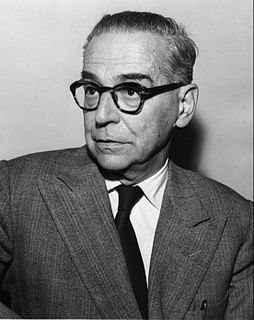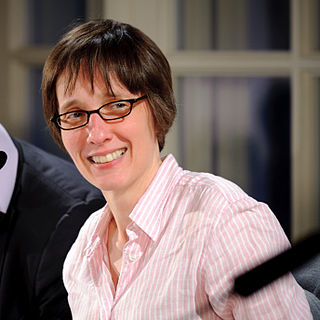A Quote by Marie von Ebner-Eschenbach
Nothing makes us more cowardly and unconscionable than the desire to be loved by everyone.
Related Quotes
Since the advent of the Internet - more recently compounded by blogging - everyone can be a published voice. Any cowardly, anonymous anger-monger can have an audience of thousands. That doesn't make them a journalist any more than my throwing an onion and a few carrots into a pot of boiling water makes me Julia Child.
To be loved but not known is comforting but superficial. To be known and not loved is our greatest fear. But to be fully known and truly loved is, well, a lot like being loved by God. It is what we need more than anything. It liberates us from pretense, humbles us out of our self-righteousness, and fortifies us for any difficulty life can throw at us.
The gospel is the proclamation of free love; the revelation of the boundless charity of God. Nothing less than this will suit our world; nothing else is so likely to touch the heart, to go down to the lowest depths of depraved humanity, as the assurance that the sinner has been loved -- loved by God, loved with a righteous love, loved with a free love that makes no bargain as to merit, or fitness, or goodness.
The primary function of poetry, as of all the arts, is to make us more aware of ourselves and the world around us. I do not know if such increased awareness makes us more moral or more efficient. I hope not. I think it makes us more human, and I am quite certain it makes us more difficult to deceive.
It is common to assume that human progress affects everyone - that even the dullest man, in these bright days, knows more than any man of, say, the Eighteenth Century, and is far more civilized. This assumption is quite erroneous. . . . The great masses of men, even in this inspired republic, are precisely where the mob was at the dawn of history. They are ignorant, they are dishonest, they are cowardly, they are ignoble. They know little if anything that is worth knowing, and there is not the slightest sign of a natural desire among them to increase their knowledge.
In actions of enthusiasm, this drawback appears: but in those lower activities, which have no higher aim than to make us more comfortable and more cowardly, in actions of cunning, actions that steal and lie, actions that divorce the speculative from the practical faculty, and put a ban on reason and sentiment, there is nothing else but drawback and negation.
Jesus wanted to show us his heart as the heart that loved so deeply. For this reason we have this commemoration today, especially of God's love. God loved us, he loved us with such great love. I am thinking of what St Ignatius told us.... He pointed out two criteria on love. The first: love is expressed more clearly in actions than in words. The second: there is greater love in giving than in receiving.
Of everything that man erects and builds in his urge for living nothing is in my eyes better and more valuable than bridges. They are more important than houses, more sacred than shrines. Belonging to everyone and being equal to everyone, useful, always built with a sense, on the spot where most human needs are crossing, they are more durable than other buildings and they do not serve for anything secret or bad.
The word desire suggests that there is something we do not have. If we have everything already, then there can be no desire, for there is nothing left to want. I think that what the Buddha may have been trying to tell us is that we have it all, each of us, all the time; therefore, desire is simply unnecessary.





































